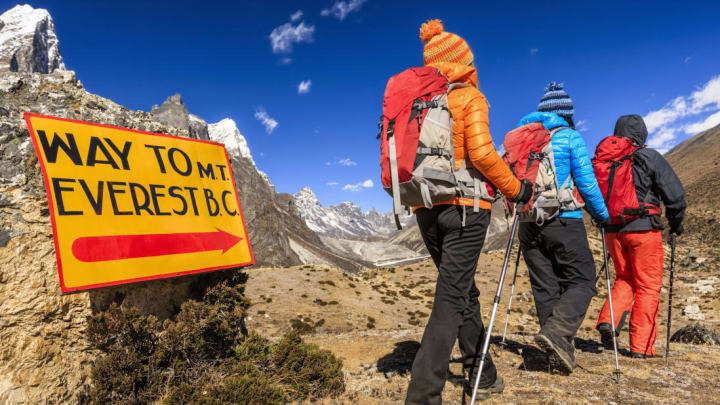At nearly 5.5 miles high, Mt. Everest’s peak is notoriously hard to climb. The mountain's unforgiving weather, harsh terrain, and high-altitude, low-oxygen "death zone" make it difficult and expensive to retrieve items left behind by those making an ascent. That includes waste and, more gruesomely, the bodies of more than 200 mountaineers who perished at some point along the way.
Many of the bodies end up staying on the mountain, but waste management is somewhat easier to tackle. According to Fodor’s Travel, climbers on the Tibetan side of Mt. Everest are now required to start carrying all of their waste (including the waste their bodies produce naturally). So yes, they’ll have to make room in their backpacks for poop.
These measures aren’t exactly extreme, though. Similar requirements are in place at popular climbing spots in the U.S., like Washington state’s Mt. Rainier and Yosemite’s El Capitan, where climbers have to poop in a bag and bring it back with them.
In addition, climbers without permits are now indefinitely banned from the Tibetan base camp. The lack of tourists will give a team of 200 people space to clean up the mountainside and remove trash, which has become a growing problem in recent years.
These new guidelines were announced by Ci Luo, director of the Chinese Mountaineering Association. Because Mt. Everest straddles the border between Nepal and China, each country manages its own side. About 70 percent of all climbers go through to Nepal, but the popularity of the Tibetan side is growing.
Mountaineer Adrian Ballinger, who has scaled Mt. Everest eight times, lauded the new changes. “Like many of the world's most beautiful places, Mount Everest is at risk of being loved to death,” he wrote in an opinion piece for ABC News. “Too many climbers, too much inexperience, and too many ethically questionable commercial outfitters chasing only profits have led to problems with trash, human waste, and unnecessary accidents, many of which unfairly impact mountain workers like the Sherpa, Tibetans, and other local groups.”
As for the Nepalese side, the government requires climbers to pay a $4000 waste deposit, which gets refunded when they return with at least 18 pounds of waste. By Fodor’s estimates, each person produces about 50 pounds of human waste over the course of a two-month trip.
[h/t Fodor’s Travel]
